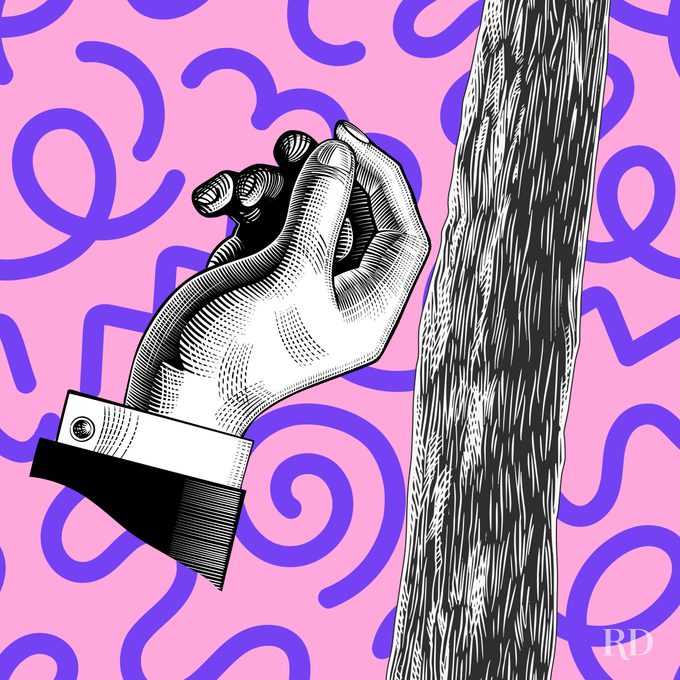Learn how this age-old superstition took root

Where Did the Phrase “Knock on Wood” Come From?

If you’ve ever said something like “I haven’t gotten a parking ticket in years” and then immediately followed it by saying “knock on wood!” while tapping a wooden desk, door frame or even your own head (we listen, we don’t judge), you’re not alone. Saying the phrase “knock on wood” has become a nearly automatic ritual for those of us hoping to dodge bad luck after saying something that might seem a little too optimistic.
But where did this tree-mendously popular superstition come from? And why do so many of us still say “knock on wood”—and/or literally do it—without a second thought? To find out how this evergreen custom took root and why the superstition is still firmly planted in our culture (all puns intended), I spoke with two language experts: Michael Adams, PhD, a professor of English and linguistics at Indiana University, and etymology expert Jess Zafarris. Read on to whittle down the origins of “knock on wood” with us.
Get Reader’s Digest’s Read Up newsletter for more fun facts, grammar, humor, travel and tech all week long.
What’s the origin of “knock on wood”?
The idiom “knock on wood” seems to allude to an ancient superstition, but its true origins remain more word mystery than word history, according to Adams.
Adams tends to be suspicious of the conventional wisdom, because the Oxford English Dictionary’s first record of the phrase “knock on wood”—meaning to knock on something made of wood as a superstitious action to ward off misfortune or bad luck—isn’t until 1907 (a slightly earlier version “touch wood” appeared in 1898). Either the superstition “is not as ancient as we believe it to be,” he says, “or somehow it remained unarticulated for a very long time, [that] there was just no word or phrase for it, and I find that hard to believe. If it’s truly ancient, and there’s a couple of millennia of usage out there, I just don’t see how it could have stayed underground for so long.”
So though we may not know the true “knock on wood” origin story, here are some theories.
Pagan rituals
Many scholars believe the expression “knock on wood” is rooted in pagan rituals to ward off evil spirits. “Early Celtic and Germanic peoples believed trees housed spirits or gods and had stories about them,” says Zafarris. “Touching wood could call on the spirits for protection or be an expression of thanks” that would bring good luck.
Christianity
Another theory links the practice to Christian traditions, where touching wooden objects—particularly the wood of the cross from Christ’s crucifixion—was seen as a gesture of faith and divine protection. According to Zafarris, “There’s been speculation that it has a connection to Christianity, though that’s probably a retcon,” or an instance of recontextualizing, the altering of an existing narrative by introducing new information at a later date.
Child’s play
Yet another possible origin story for “knock on wood” comes from British folklorist Stephen Roud. In his book The Lore of the Playground, Roud traces the superstition back to a 19th-century children’s game called “Tiggy Tiggy Touchwood,” a variation of the game tag, in which players who touched a piece of wood were exempt from capture. Knocking wood, he believed, evolved to transcend the game and become a form of protection everywhere.
What is the symbolism of wood?

Wood holds deep symbolic meaning across various cultures. As a natural element, it represents life, growth, strength and connection to the earth.
“Trees are entirely tied up with notions of life and death and rebirth and fate and the divine,” says Zafarris. The concept of the tree of life—representing the source of life, the connection between all lives or the cycle of life and death—is found in many cultures and religions.
In mythology and folklore, trees were often seen as sacred gateways between worlds—linking the human, spiritual and natural realms. In Eastern philosophies, wood is one of the five elements representing spring, creativity and renewal. The act of touching or knocking on wood taps into these broader symbolic associations of protection, vitality and grounding.
How has the phrase “knock on wood” evolved?
The phrase “knock on wood” has evolved from the physical practice of knocking on a tree to summon good luck (if you subscribe to the pagan origin theory) into a symbolic action.
In British English, the more typical idiom is “touch wood,” while in American English we say “knock wood.” And the expression, or a version of it, exists in many parts of the world, according to Zafarris. “Even if we don’t have the exact phrasing, it’s a little bit everywhere.”
Middle Eastern cultures, she says, sometimes use variations of the phrase, “implying hold the wood when you’re hoping for continued luck.” In Indonesia and Malaysia, “you might knock or touch your forehead, which could be a similar concept.” And in Eastern Europe, knocking on “unpainted wood can help it hold up.”
What’s the modern usage of “knock on wood”?
In modern times, “knock on wood” lives on both verbally and literally—though at this point, says Zafarris, it may be “more a matter of habit than actual superstition.”
It’s become a casual, almost unconscious ritual that bridges cultures and generations. Though we’re probably no longer knocking on actual trees, we tap on the desk, the table, the floor—whatever—to avoid bad luck. “I will knock on wood when I say it,” says Adams, “and as a joke, I’ll knock on my head.”
The expression is a fixture in everyday conversation. You’ll hear things like:
- “I’ve never missed a flight—knock on wood!”
- “Business has been great lately (knock on wood).”
- “My dentist appointment should be easy-peasy, knock wood. I never have cavities.”
- “Looks like the weather for my trip to Lisbon will be perfect. Knock on wood.”
You’ll also see “knock on wood” pop up in pop culture, with characters using the phrase and/or the action to half-jokingly guard against bad luck. And who can forget that disco classic, “Knock on Wood” by Amii Stewart?
So, whether you’re a true believer or just following habit, saying “knock on wood” connects you to a long human history of hoping for the best—while hedging our bets with a little tap.
About the experts
|
Why trust us
At Reader’s Digest, we’re committed to producing high-quality content by writers with expertise and experience in their field in consultation with relevant, qualified experts. We rely on reputable primary sources, including government and professional organizations and academic institutions as well as our writers’ personal experiences where appropriate. We verify all facts and data, back them with credible sourcing and revisit them over time to ensure they remain accurate and up to date. Read more about our team, our contributors and our editorial policies.
Sources:
- Michael Adams, professor of English and linguistics at Indiana University Bloomington and author of Slayer Slang: A Buffy the Vampire Slayer Lexicon; phone interview, May 16, 2025
- Jess Zafaris, etymology expert, founder of Useless Etymology, co-host of the Words Unravelled podcast and author of several books, including Words from Hell; phone interview, May 21, 2025
- Oxford English Dictionary: “Knock on wood”
- Oxford English Dictionary: “Touch wood”
- History.com: “Why do people knock on wood for luck?’
- The Lore of the Playground by Stephen Roud
- Brittanica: “Tree of Life”
- Merriam-Webster: “Retcon”























